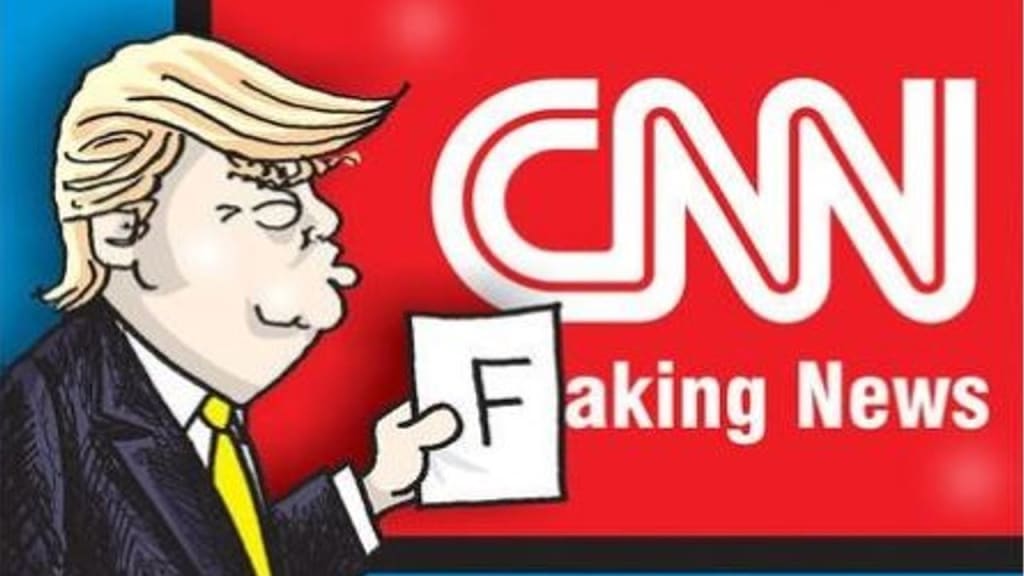Donald Trump, Fake News, and the Illusion-of-Truth Effect
How Lies, Social Media, and Our Brain Can Lead to the Spreading of "Fake News"

Over the past year, the topic of “fake news” has been all over the news thanks largely in part to Donald Trump and the 2016 presidential election. Throughout the election year and still to this day, many websites have published stories that have little to no factual claims. But yet many of these fake news stories have convinced people that they are in fact factual and credible. The spread of fake news could be related to the illusion-of-truth effect which states that the more someone hears a statement, the more likely they are to believe that it is true.
David Eagleman gives an example of how the illusion-of-truth effect shows itself in politics in his 2011 book, Incognito: The Secret Lives of the Brain. The word “RATS” was displayed at the same time as “The Gore Prescription Plan” in an effort to get people to unconsciously associate the two together (Eagleman 65-66). Political attack ads are built on this tactic of slandering the opponent. Hillary Clinton and the attack on the American compound in Benghazi is one the most well-known criticisms and points of attack towards a political candidate in recent time. One of the political ads that aired on television during the 2016 presidential election was an attack ad from the National Rifle Association on Hillary Clinton. The ad features Mark Geist, a member of the team that rescued 25 Americans in the Benghazi compound attack. Mark is seen walking through Arlington National Cemetery and eventually says he is not voting for Hillary Clinton because of her and her relation to Benghazi (Reston). This advertisement is not the only time people have blamed Hillary Clinton for Benghazi. When the topic of Benghazi was brought up it was almost certain Clinton’s name would soon follow. This constant repetition of having Benghazi and Hillary Clinton’s name mentioned in the same conversation made the two almost synonymous with each other.
There are other examples where the illusion-of-truth effect can be seen in politics with such claims as Barack Obama is a Muslim, or he was not born in the United States. These claims are false but the reason they still exist is that of the illusion-of-truth effect. One website has a story which claims Obama was not born in the United States. Let’s say 100 people see that story and tell their friends about it or share it on social media which results in more people seeing it. Then another website sees that claim and makes an article about the same false claim. As more and more websites publish articles on the topic, the more likely people are going to believe it or at least think the story has plausibility.
A study from the Central Washington University was conducted to see “whether repeated exposure to fictitious stimuli would cause participants to develop a false memory for having heard about the false news stories from a source outside of the experiment” (Polage). The results of the study found that those who were exposed to fake news were more likely to believe that it was true (Polage). This study is helpful to have research behind the claim that fake news can be influential on a person’s thoughts and memories.
Society is currently in the age of technology where anyone can spread fake news through social media. Just in the past week, there is a good example of how fake news can spread in an instant. The mass shooting in Las Vegas led to a false claim that the suspect was a Democrat who was against Donald Trump. This claim eventually made its way to websites which wrote articles about the false claim. Those news stories were then shared on Facebook and other sites. The more likes and shares these posts received, the more believable this claim became to people (Levin).
The illusion-of-truth effect and the effect it has on the news can be quite dangerous in a time where anyone can post something on the internet. False information can sometimes move faster than the truth. This is an issue we will have to deal with in the coming future to prevent false information that could have a negative impact on everyday things.
Works Cited
- Eagleman, David. Incognito: the secret lives of the brain. New York, NY, Vintage Books, 2011.
- Levin, Sam. “Facebook and Google promote politicized fake news about Las Vegas shooter.” The Guardian, Guardian News and Media, 2 Oct. 2017, www.theguardian.com/us-news/2017/oct/02/las-vegas-shooting-facebook-google-fake-news-shooter.
- Polage, Danielle C. “Making up History: False Memories of Fake News Stories.” Europe's Journal of Psychology, 8(2), 21 May 2012, pp. 245–250., doi:10.5964/ejop.v8i2.456.
- Reston, Laura. “What Explains the NRA’s Benghazi Ad?” New Republic, 1 July 2016, newrepublic.com/article/134798/explains-nras-benghazi-ad.






Comments
There are no comments for this story
Be the first to respond and start the conversation.